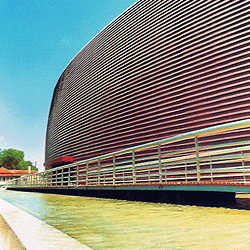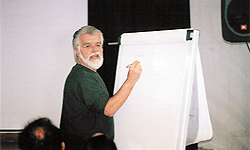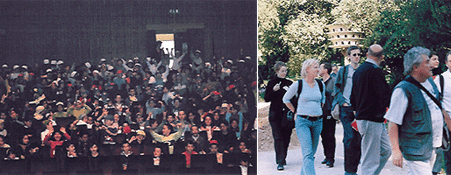Cinanima, the Espinho International Animation Festival, celebrated its 25th anniversary this year. Abi Feijrelates the festival's beginnings and what it means to the Portuguese animation community. Includes a photo gallery!

Cinanima's dynamic home. All images courtesy of and © Cinanima.
Cinanima actually began as an exhibition of comics and the screening of some animated films in 1976. The results and the response was so encouraging that it led the first organizing group to aim higher and the next year the first edition of the International Festival took place. The organizing committee was composed of people from different backgrounds, but they were all cinema lovers who wanted to develop the activities of the local CineClub. In only four years they were able to set the foundation and reputation of Cinanima, creating a very friendly festival with good programs. Plus, special attention was paid to create public awareness of and involvement in animation through the organization of parallel activities such as animation workshops.
At that time, only a few years after the Portuguese "Carnation Revolution," which brought freedom back to Portugal, there were only a few Portuguese animators; most of them doing commercials. Only one studio was trying to survive doing TV series for children. There was also some governmental support to finance a few animated films, but, unfortunately it stopped quite soon. For about 15 years there wasn't any money for short films and very little for other kinds of animation. As a consequence, an entire generation of Portuguese animators were suffocated and it was very hard for Cinanima to carry out its task of developing an animation film festival in a country where almost no animation films were being produced. There were many years without a single Portuguese film being shown at Cinanima.


Festival Director Antonio Gaio, who is also the author of a book on Portuguese animation cinema. Author António Costa Valente signing his new book Cinema Without Actors.
But this perseverance, together with all the workshops held at Cinanima, brought to fruition a new generation of Portuguese animators that started to appear in the early '90s when the Portuguese government decided, pushed by the European community, to start supporting animation. From that moment on this support has continued to grow and Portuguese animation is accepting the challenge and is beginning to receive international recognition.
Today at Cinanima we can attest to an important national competition, what was impossible just ten years ago. Cinanima has played a very important role in this development. This year there were 10 Portuguese films in the international competition and more than thirty in the national one. But it is not only at a national level that Cinanima is an important festival. Twenty-five editions in 25 years makes Cinanima one of the most important animation festivals in the world. It has been recognized by the European Community as one of the festivals qualifying for the highest European award -- The Cartoon D'Or -- and also by Hollywood's Academy of Motion Picture Arts and Sciences. Films awarded in Espinho qualify for the Oscars. In recent years Cinanima has also improved their cash prizes in each category, which now total 29,000 Euro. This has meant an entry increase from an average of 250 films per year to more than 500 this past year.
Cinanima also cares about the festival's quality and tries hard to fulfill the ASIFA guidelines for an outstanding animation festival. To that end, they have improved their selection jury, which now has two international members and is able to stand at the same level of every other major international animation festival.
But the most important thing is the way guests are welcomed at Cinanima. They enjoy the warmth of the people, the respect they have earned. There are not too many screenings to attend and it is always possible to find time to recover from late night parties and meet other guests. And, if they are lucky, they can enjoy the nice weather even in early November. However, even the best festival director cannot guarantee that!

Dave Master teaches one of Cinanima's workshops.
A list of winners for Cinanima 2001 was included in AWN's Headline News.
 Visit a Gallery of photos from Cinanima's 25 years!
Visit a Gallery of photos from Cinanima's 25 years!
Abi Feijó was born in Braga, Portugal in 1956 and graduated from the Oporto School of Fine Arts. In 1984 he went to the National Film Board of Canada for an animation internship, which resulted in the short film
Oh que Calma. Soon after, he founded Filmógrafo, an animation studio based on the NFB model of handcrafted auteur animation, where he serves as producer and artistic director. He was elected president of ASIFA, the International Animated Film Association, in 2000 and is currently involved in establishing a cultural center devoted to the art of animation in Oporto. He also gives training workshops around the world. His films have won roughly 40 international prizes and honorable mentions. His most recent film was Clandestino (Stowaway), in 2000.








